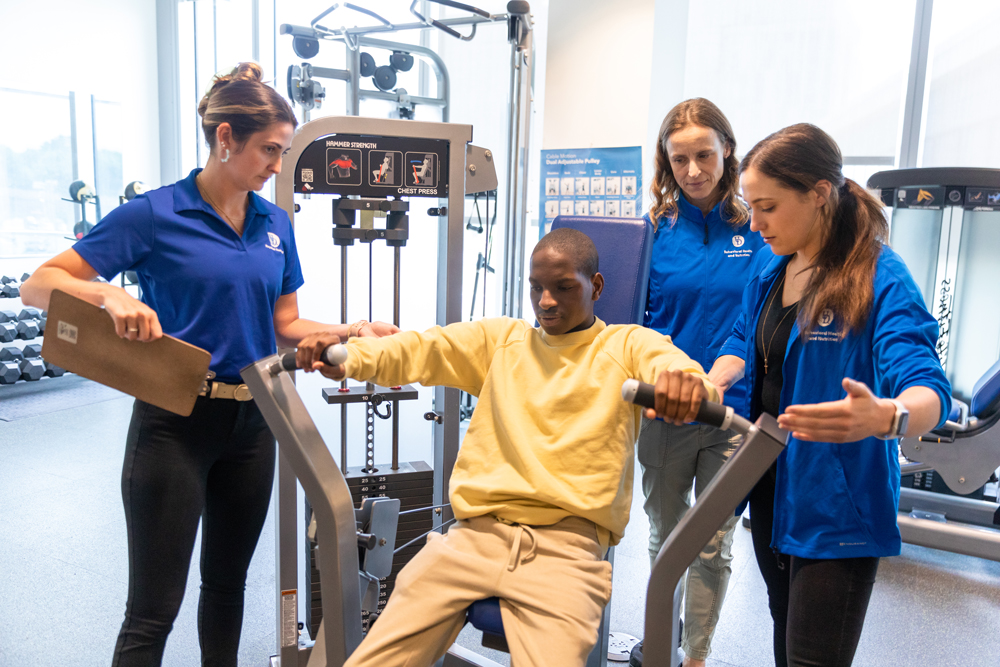
HEALTH BEHAVIOR SCIENCE

About the program
Health Behavior Science is the study of how individual, social, and environmental factors shape health and well-being across the lifespan in diverse populations. We work to promote healthy lifestyles and reduce the burden of disease through the development, implementation, and evaluation of strategies designed to change health behaviors for individuals and communities.
This mission is accomplished in the Health Behavior Science major through practicum and internship experiences with community organizations and agencies, course work, and research experiences. An opportunity to gain topical knowledge and experience, in a secondary area of interest, is gained through an approved minor.
Example topics of study in Health Behavior Science include: Mental health and disorders, health disparities, substance abuse, physical activity promotion, sleep health, disability and health, health through the lifespan, global health, social determinants of health, and health communication.
The Health Behavior Science major includes 120 course credit hours. In addition to the major curriculum, students choose an approved minor. Upon completion of the curriculum, students will be prepared to:
- Define and describe concepts of health and health promotion.
- Examine and discuss current issues in health behavior science.
- Explain and predict health behaviors across diverse populations.
- Measure the health status of a targeted population.
- Apply appropriate evidence-based theories and models to change health behaviors.
- Collect, analyze, interpret, and describe qualitative and quantitative health data.
- Design and evaluate health promotion, education, and behavior change strategies, programs, and interventions to address human health and disease.
- Work independently or as part of a team to solve a problem related to health promotion.
Health Behavior Science graduates work in a variety of settings including (but not limited to) medical facilities, college campuses, government agencies, non-profit organizations, corporate worksites, and health-related businesses. In these settings, professionals work with multiple populations including older adults, individuals with disabilities, children, and adolescents.
Within medical facilities, career options include working one-on-one with patients and families or working with at-risk populations. Health Behavior Science majors pursue careers in medicine, occupational therapy, and physical therapy. On college campuses, efforts can focus on promoting student health via residence life, recreation programs, or counseling programs. In government agencies, options include working with local and state public health departments, on statewide councils, or on national committees that address specific health issues. In non-profit organizations, efforts focus on addressing the health issues of interest to the organization via program development, needs assessment, marketing and communication, and community outreach. Within corporate worksites, options include employee health promotion programs and worker assistance programs. Health Behavior Science majors also work in health-related businesses providing marketing support and program delivery.
Health Behavior Science majors graduate with skills to:
Measure the health and wellness of specific populations
Identify priority populations for interventions
Plan health promotion programs for specific audiences
Conduct program evaluations
Provide health-related screening services
Coach or counsel individuals to reach health goals
Lead workshops, training sessions, or classes
Develop and implement communication or social marketing campaigns
The United States Department of Labor’s Bureau of Labor Statistics projects behavioral science careers such as Health Educators, Community Health Workers, and Survey Researchers, will grow by about 13% through the year 2029.
Health Behavior Science students choose a minor program of study, a secondary academic discipline. Minors provide an opportunity to specialize in an area of interest and position students for careers within the field of Health Behavior Science. Suggested minors for Health Behavior Science students include:
Biology
Business Administration
Dance
Disability Studies
Entrepreneurial Studies
Exercise Science
Forensic Science
Health, Physical Activity, and Disability
Leadership
Medical Social Services
Nutrition
Public Health
Psychology
Strength and Conditioning
Health Behavior Science majors are not able to minor in Health and Wellness.
